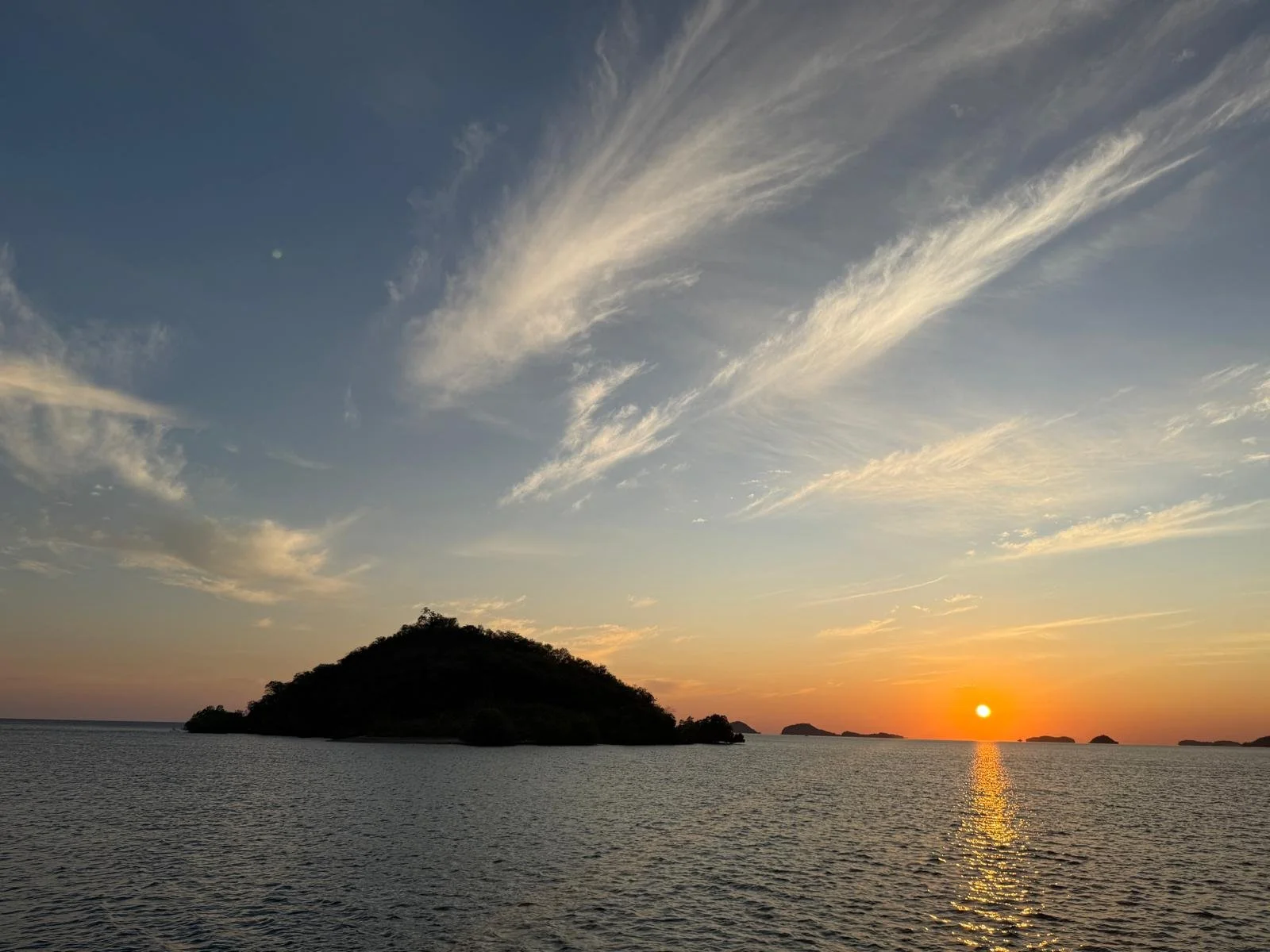Year 2- 27 August 2025 –Ruing to Bari Bay -Flores
We woke at 5,45am and prepared to leave. This meant raising the dinghy and putting away the solar panels etc.
It was a beautiful morning and going to be a hot day. There was some wind – about 12 kts which I did not expect and hope we may be able to sail. We had some tea and upped the anchor and headed out of the anchorage. We had to navigate round the coral reefs that we had come through on the way in and we saw one of the large squid boats coming back. These are large, long boats with huge, long wooden out riggers from which they suspend their lines to catch the squid. It phut phutted past us as we excited. We saw it leave about 5.00pm the previous evening.
Once out of the reefs we headed west toward Bari Bay which is where we plan to anchor. There are apparently flying foxes at dusk going toward the mainland. The wind seemed to die and so we continued to motor. We saw the odd fishing boat and there was one tanker coming towards us from the East.
We motored on and then the wind came up a bit so I tried to sail and we were soon doing 4+kts. I wanted to sail to test the generator and the water maker. The generator went well and stayed to normal temperature. However, whilst the water maker ran well to start with it started to lose pressure a bit which it did a few days ago. I therefore turned it off and checked what the cause could be. I sort of had this problem about a year ago. Online it suggested checking the water inlet, checking the filters were not blocked, that there were no leaks. Checking the normal pump is working and finally checking the capacitors in the pump (which is what I had a problem with before). There was no way we could do these checks now as the engine room was like a sauna. The wind also died and so we had to motor again. Clearly I need to sort out the water maker as it is so important bearing in mid where we are.
We motored on and the wind did not increase or was at the wrong angle. The engine ran hotter than normal but did not overheat and it was such a hot day. We did not overstress it and it just ran at 75 rather than its usual 60 degrees. We saw little traffic and just chatted and studied the different type of buoys and also the collision regulations which are so important to understand.
Eventually we came to Bari Bay and had to navigate round some reefs again to get to a ledge off Lingos Island which was about 15 m. The chart plotter was not that accurate so we were using Google Earth and Google Maps on satellite to help us navigate. At one point we came quite close to the reef as the depth dropped to about 6m and then we pulled away and dropped the anchor off the Island in about 15 m of water. The anchor did not bite initially but then did and so we settled down to check we were ok. We were and we were not expecting high winds at all.
We had an initial refreshing drink and then chilled and watched the sun go down. We saw a number of fishing boats and little canoes fishing near us. We saw every now and then something surface with a splash. We sat and had a beer on the aft deck and waited for the flying foxes. They did come eventually before it go dark but not in the numbers we thought we would see. They were like large bats or fruit bats which I had seen in French Polynesia and Australia. There were a number every now and then so they were sort of piecemeal.
Pteropus is a genus of megabats which are among the largest bats in the world. They are commonly known as fruit bats or flying foxes, among other colloquial names. They live in South Asia, Southeast Asia, Australia, East Africa, and some oceanic islands in the Indian and Pacific Oceans. There are at least 60 extant species in the genus.
Flying foxes eat fruit and other plant matter, and occasionally consume insects as well. They locate resources with their keen sense of smell. Most, but not all, are nocturnal. They navigate with keen eyesight, as they cannot echolocate. They have long life spans and low reproductive outputs, with females of most species producing only one offspring per year. Their slow life history makes their populations vulnerable to threats such as overhunting, culling, and natural disasters. Flying foxes are often persecuted for their real or perceived role in damaging crops. They are ecologically beneficial by assisting in the regeneration of forests via seed dispersal. They benefit ecosystems and human interests by pollinating plants.
Once it got dark we could not see them and Tony and Jon made supper of wahoo, rice and vegetables which was nice listening to Katie Mellua. It was a lovely starry night with very good clarity and we can see the milky way. A fine end to the day.
The picture of the day is our departure from Ruing as the sun came up.
Need/Opportunity Year Three
In year three I will be going from Thailand to Sri Lanka, India, Maldives and then on to Chagos, Mauritius, Reunion, Cape Town, St Helena, Azores and back to the UK. I am looking for crew from Mauritius/ Reunion Island to Cape Town and from Cape Town to the UK. If of any interest do email me.
The blog will continue as we continue the journey. If you have any comments or suggestions about the blog then do email me on hine.nick9@gmail.com
